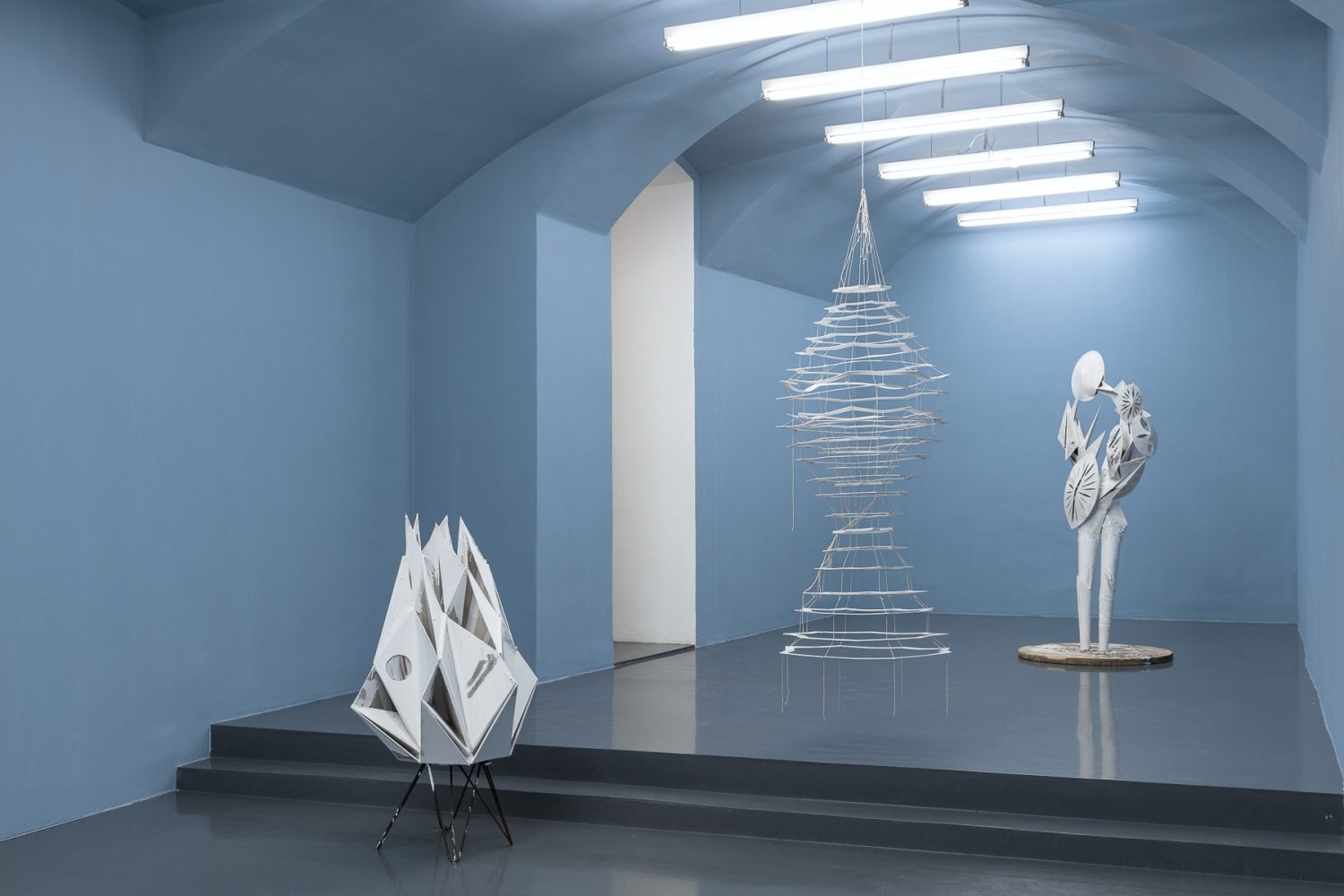Tillman Kaiser
Harmolodic Substi
12 Mar - 18 Apr 2020
TILLMAN KAISER
Harmolodic Substi
12 March – 18 April 2020
In the exhibition Harmolodic Substi, Tillman Kaiser presents new works that are all composed of the same base material – painted cardboard. Yet they could scarcely be more different in their relationship between gravity and weightlessness, open and enclosed form, dynamism and tranquility. Collectively they combine to form a polyphonic spatial composition, while the gallery space painted in RAL 5014 – dove blue – creates an optical bracket connecting the sculptures with the rooms. Informing the work is Kaiser’s ongoing engagement with the human figure and its relationship to space and architecture, along with his intensive preoccupation with structure and composition, which in turn correlate to corresponding issues in music. The exhibition title refers to Harmolodics, the compositional and improvisational method developed by American jazz musician Ornette Coleman, which strives for immediate and open expression in music and treats harmony, melody and rhythm as equal elements.
A sculpture standing on black hairpin legs, constructed predominantly out of triangular cardboard elements and a few glass plates, unfolds into a kind of gigantic flower bud. It is generously and haphazardly coated in white oil paint. The glass panels serve as a reference to the religious and folkloristic practice of reverse glass painting. A hanging work based on an octagonal star is inspired by an architectural detail from St. Stephen’s Cathedral in Vienna: the ring of stars at the base of the organ above the bust of master builder Pilgram. Kaiser repeats this fragile form by incorporating paper cutouts made by his son, whereas the column-shaped sculpture made out of interlocking, evenly ascending cardboard triangles is something he found in a former car factory. Another modular piece made of cubes stacked inside and on top of one another have children’s drawings embedded. A complex formation rising up from two leg-like columns is the most humanoid, echoing familiar motifs from earlier works such as masks or eyes. Offering a counterpoint to these new, almost entirely white works is Vampir (2005), a hanging sculpture made out of two silver metal cans and a geometric cardboard body painted black.
The fact that the artist does not conceal anything and leaves traces of his working process visible often lend Kaiser’s sculptures the provisional quality of models or prototypes: components are joined with glue or metal clamps, usually coated in oil paint. Chance and plan, design and improvisation intersect in his works. By incorporating everyday items and found objects he connects different spheres of life and subverts hierarchies. Art and life collide unpretentiously in his practice, as his children’s drawings and other creative output flow seamlessly through his works.
Harmolodic Substi
12 March – 18 April 2020
In the exhibition Harmolodic Substi, Tillman Kaiser presents new works that are all composed of the same base material – painted cardboard. Yet they could scarcely be more different in their relationship between gravity and weightlessness, open and enclosed form, dynamism and tranquility. Collectively they combine to form a polyphonic spatial composition, while the gallery space painted in RAL 5014 – dove blue – creates an optical bracket connecting the sculptures with the rooms. Informing the work is Kaiser’s ongoing engagement with the human figure and its relationship to space and architecture, along with his intensive preoccupation with structure and composition, which in turn correlate to corresponding issues in music. The exhibition title refers to Harmolodics, the compositional and improvisational method developed by American jazz musician Ornette Coleman, which strives for immediate and open expression in music and treats harmony, melody and rhythm as equal elements.
A sculpture standing on black hairpin legs, constructed predominantly out of triangular cardboard elements and a few glass plates, unfolds into a kind of gigantic flower bud. It is generously and haphazardly coated in white oil paint. The glass panels serve as a reference to the religious and folkloristic practice of reverse glass painting. A hanging work based on an octagonal star is inspired by an architectural detail from St. Stephen’s Cathedral in Vienna: the ring of stars at the base of the organ above the bust of master builder Pilgram. Kaiser repeats this fragile form by incorporating paper cutouts made by his son, whereas the column-shaped sculpture made out of interlocking, evenly ascending cardboard triangles is something he found in a former car factory. Another modular piece made of cubes stacked inside and on top of one another have children’s drawings embedded. A complex formation rising up from two leg-like columns is the most humanoid, echoing familiar motifs from earlier works such as masks or eyes. Offering a counterpoint to these new, almost entirely white works is Vampir (2005), a hanging sculpture made out of two silver metal cans and a geometric cardboard body painted black.
The fact that the artist does not conceal anything and leaves traces of his working process visible often lend Kaiser’s sculptures the provisional quality of models or prototypes: components are joined with glue or metal clamps, usually coated in oil paint. Chance and plan, design and improvisation intersect in his works. By incorporating everyday items and found objects he connects different spheres of life and subverts hierarchies. Art and life collide unpretentiously in his practice, as his children’s drawings and other creative output flow seamlessly through his works.

